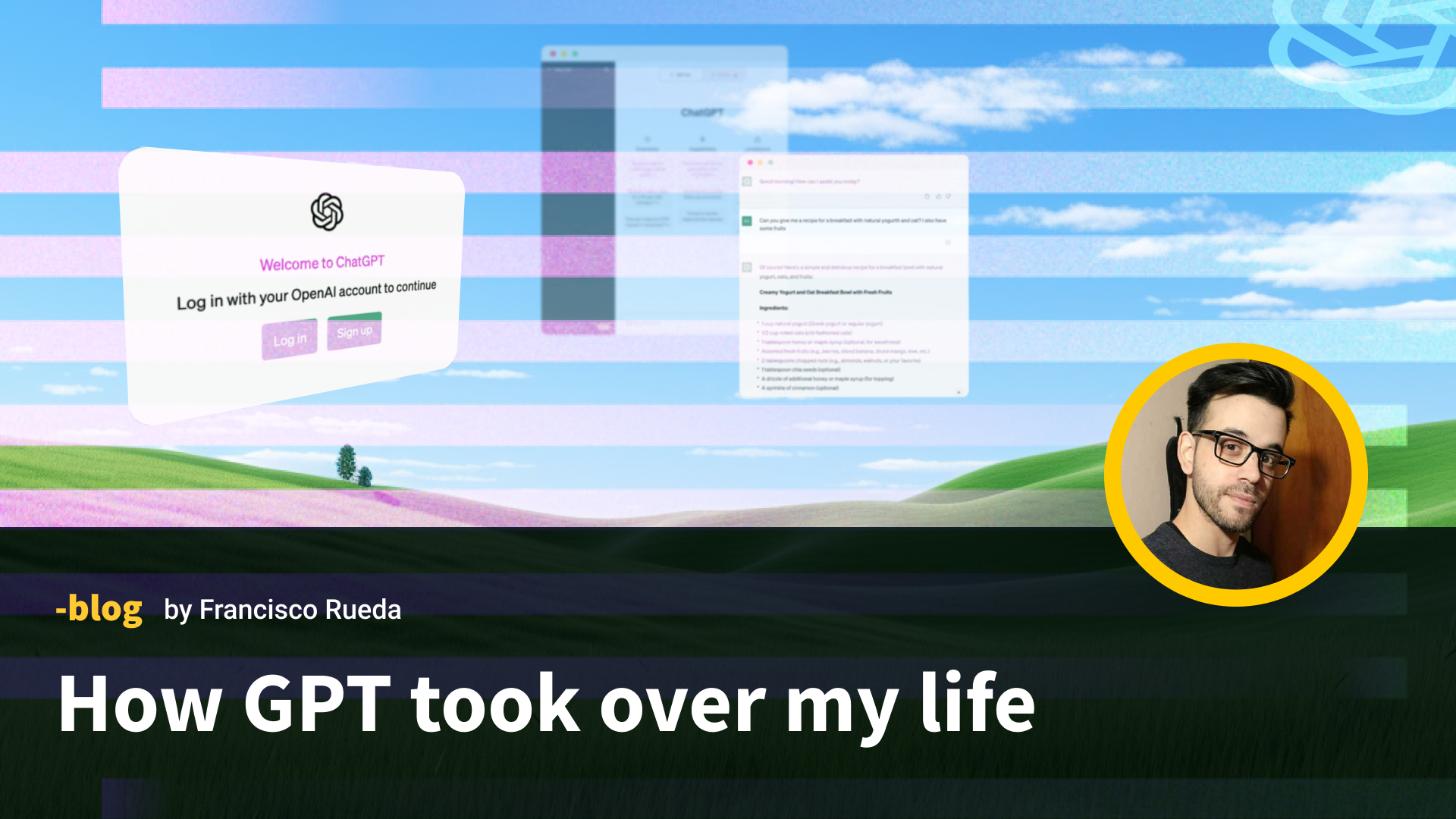There I was, lost in the depths of coding. Sleep? That was a luxury. A luxury that the titanic puzzle of coding and debugging savagely denied me. Then, a knight in shining armor emerged from the chaotic battlefield of the internet. Its name? ChatGPT. An evil AI? Maybe. A life saver? Absolutely.
Coding
Previously, my life was defined by a beautiful mess of coding, endless debugging and tears in front of my computer. There was a certain charm in spending countless hours trying to find that elusive bug in my code, a twisted satisfaction when my code would fail and crash. Now, thanks to GPT, those days are long gone. This devilish AI doesn’t just solve my coding issues like a knife through butter. Oh no. It banishes my frustration and despair, replacing them with smooth sailing and quick solutions. The consequence? I can now sleep. Proper sleep. Like an ordinary human being getting their full eight hours of peaceful slumber. Suddenly, I’m not just a shell of a person surviving on coffee and determination. I’m rested.
👉 Now, if you’re in my shoes, embarking on this coding journey with ChatGPT, there are a few pointers you might want to remember.
Despite its wizardry, ChatGPT is still AI. It can’t share your frustration, it merely computes it. You need to actively participate in the debugging process. Think of it as a tool, a helper. If the solution provided doesn’t resolve your issue, feel free to ask follow-up questions, clarify what you’re struggling with, or describe the problem in different ways.
Keep in mind to use clear and simple language. The eloquent jargon you might want to use might not always be necessary or understood. A simple “My Python script is slow. How can I speed it up?” will suffice.
Most importantly, be specific about your coding issue. Rather than saying, “There’s a problem with my code,” give detailed information, such as “My Python code is throwing a KeyError at line 20.”
And lastly, if you’re not getting the help you need, don’t hesitate to rephrase your question. Instead of, “Why won’t my code run?”, you could ask, “Can you identify the error in this specific part of my code?”
Remember, ChatGPT can not only interpret your code but also help you write new code. But the suggestions it provides are guidance, not definitive solutions. Test all changes thoroughly and seek the advice of experienced developers for the best results.
And the terror did not stop there. It gets worse.
Learning German
ChatGPT showed no mercy when it came to my language skills. When I decided to learn German, I was looking forward to the frustration, to those ‘Aha!’ moments when I finally got the difference between ‘der’, ‘die’ and ‘das’. From basic to intermediate, it was like a teacher guiding me, word by word, until the unthinkable happened: Now, instead of politely nodding and smiling at Austrians, I have to engage in full-fledged conversations with them. The audacity of this technology, right?
👉 You see, while ChatGPT could pass for a native German speaker, it lacks the nuances that come with real-world interaction. It can’t enjoy a good schnitzel or share local anecdotes, which makes practicing with actual humans irreplaceable. So, to conquer this next stage of my language learning journey, I have some strategies at my disposal when interacting with ChatGPT.
Firstly, keeping my language clear and simple is essential. I can start with basic sentences or phrases, and gradually move on to more complex structures as my understanding improves.
Secondly, I shouldn’t hesitate to ask follow-up questions. If a certain phrase or grammar rule doesn’t make sense to me, I can seek clarification. ChatGPT’s knowledge is extensive, and it’s here to help me, after all.
Lastly, setting my expectations correctly is crucial. I appreciate the AI’s assistance with language practice, but I am also aware that real-world conversation practice with native speakers is a different ballgame altogether. It’s here that my fluency will be truly tested and improved.
Cooking Recipes
Then came the cooking nightmare. You see, I was perfectly content with my greasy takeouts and microwave meals. But no, the villainy of this wicked AI doesn’t stop there. It teaches me recipes. Not just any recipes. Healthy recipes! The horror. ChatGPT decided I was in desperate need of a culinary upgrade. With its unlimited ideas for recipes, I am forced into a life of fresh, tasty, and - worst of all - healthy food. Imagine! I’m talking gluten-free, sugar-free, lactose-free – all the ‘free’ stuff that, surprise, actually makes you feel good. Now, I can’t order food without feeling guilty, and worst of all, I’ve become a slave to the joys of culinary exploration. What a nightmare.
👉 When you find yourself in the culinary battlefield, you can rely on ChatGPT as your faithful chef, offering a seemingly infinite menu of dishes. But remember, this AI isn’t an experienced chef, so approach its culinary wisdom with a pinch of salt.
As you find yourself navigating through the chaos of a new recipe, you might want to use example-based instructions. You could say things like, “Can you suggest a dish that’s similar to this one, but with chicken instead of beef?”
If you come across a step that seems as clear as a thick soup, don’t hesitate to ask for clarification. And when it comes to experimenting, feel free to mix and match ingredients. You could ask things like, “How would turmeric change this dish?”
But remember, always trust your taste . ChatGPT may suggest, but you decide. And, if you’re considering major dietary changes, professional advice is always recommended.
But brace yourselves. The worst is yet to come.
Mental Health
ChatGPT’s influence doesn’t stop at my physical health - it extends to the domain of mental well-being too. This AI, with its vast capabilities, has the audacity to offer me advice on managing my mental health. I was skeptical at first, but to my surprise, some of the suggestions provided practical value. Previously, I lived in a world dominated by overthinking and constant hypothetical situations. Now, ChatGPT has introduced me to techniques like mindfulness and meditation, nudging me towards focusing on the present moment. I never imagined I’d be learning such crucial life skills from an AI. How dare it! The sneaky evil AI had now taken over my work, my language skills, my kitchen, and even my mind!
👉 ChatGPT might seem like a gentle listener, offering comfort and advice when you’re feeling low. But remember, it’s an AI, not a licensed therapist.
Consider it a supportive friend who can offer general advice for managing stress, but never forget the importance of professional help. If you need more clarity on a mindfulness technique, don’t hesitate to ask follow-up questions.
Being specific about your situation can yield more tailored advice. Saying something like, “I’m feeling stressed because of work. What are some strategies to manage this?” may prove helpful.
However, if things seem persistently bleak, a qualified mental health professional should be your go-to. ChatGPT is supportive, but it’s not a replacement for professional treatment.
So, this is my story - a cautionary tale of how the seemingly benign ChatGPT can swoop into your life, take away all the mess and frustration and replace it with ease, peace and productivity. The audacity! Life was meant to be a struggle, a constant learning curve, but now it feels like I’ve been given an unwanted cheat code. Be warned, before it’s too late and you find yourself, like me, with more free time, a healthy body, and a peaceful mind. How dare you, ChatGPT!
👉 Mastering prompt writing is crucial for obtaining valuable responses from AI language models like ChatGPT.
- Be clear, specific, and provide context: Clearly state your question, be specific, and give relevant background information.
- Define your goal and focus on one topic: Communicate the purpose of your conversation and stick to one subject at a time.
- Use natural language and examples if relevant: Be conversational and provide examples to clarify your query.
- Ask for reasoning and use “What,” “How,” “Why” questions: Encourage detailed responses by seeking explanations and using open-ended question words.
- Experiment and iterate with prompts: Try different approaches to find the best way to get accurate and helpful answers from ChatGPT.





